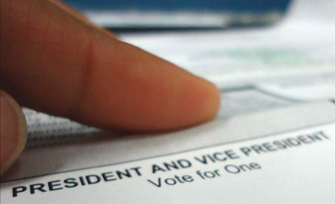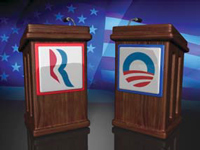Will anybody but Obama strategy work for GOP?
By Askia Muhammad -Senior Correspondent- | Last updated: Oct 25, 2012 - 10:28:54 AMWhat's your opinion on this article?

|
Seated on the dais at the white-tie Al Smith charity dinner at New York’s Waldorf-Astoria Hotel Oct. 18, separated by Cardinal Timothy Dolan, the archbishop of New York, President Obama said he and Gov. Romney have some things in common, like their unusual middle names. “Actually, Mitt is his middle name,” the president—whose full name is Barack Hussein Obama—joked about Willard Mitt Romney. “I wish I could use my middle name.”
The humorous comment belies Mr. Obama’s dilemma. Despite his modestly successful achievements during his term in office, and his opponent’s gaffe-filled, “etch-a-sketch” campaign of redefining himself as someone other than the ultra-conservative who campaigned and won the GOP nomination, just two weeks before Election Day Nov. 6 the incumbent was still viewed in the minds of many voters as a “Muslim,” and a “Socialist” who may not have even been born in this country.

|
The Republicans have been successful in making the president look vulnerable. “It’s interesting that there is almost an ‘anybody but Obama’ type platform that the Republicans have put forward,” Gloria Browne Marshall, who teaches college-level law in New York City, and who authored two books on the law, told The Final Call outside Lynn College in Boca Raton, Fla., just before the final encounter.
“A five-point plan in which you have no clear points and you have a foreign policy which is just ‘show strength’ but there is no specific underpinning to the show of strength. So we don’t really have a foreign policy plan from Willard Mitt Romney.”
Mr. Obama’s lackluster performance in the first debate Oct. 3 in Denver seemed to give voters wanting an excuse to vote against the president a good reason and Mr. Romney then surged in the opinion polls. And while the president clearly outpointed his opponent in their second debate Oct. 16 in Hempstead, New York Mr. Romney continued to make gains in his popularity and the race tightened to a statistical dead heat by the time the third debate rolled around.
The president characterized the “shape-shifting” by his opponent on the campaign trail in Virginia the day before the final debate. “He’s forgetting what his own positions are, and he’s betting that you will, too. I mean, he’s changing up so much and backtracking and sidestepping, we’ve got to—we’ve got to—we’ve got to name this condition that he’s going through. I think—I think it’s called ‘Romnesia.’ That’s what it’s called.” Mr. Obama said.
Conventional wisdom held that the foreign policy arena should have been Gov. Romney’s weak area. “His past summer travail between the countries in Europe and of course the Middle East left him looking awkward and actually rubbed people the wrong way in other countries,” said Prof. Browne-Marshall. “But he has been putting on a good front since then, and has advisers who now, have gotten him where he can go toe to toe with the president on foreign policy.”
Gov. Romney was criticized for comments he made on his overseas trip that ruffled British and Palestinian leaders last summer, and for hastening to criticize the administration’s response even as chaotic events were unfolding in Libya and Egypt.
But it was the administration which was often put on the defensive. One of the most contentious issues in the second debate was the Sept. 11 attack on the U.S. Consulate in Benghazi, Libya. The subject sparked a sharp exchange, and has overshadowed the administration’s four year record which has made Secretary of State Hillary Clinton one of the most traveled foreign ministers in U.S. history.
“There is any list of domestic as well as foreign issues in which the president has been very successful,” Professor Browne-Marshall said.
“But his communication has been very weak as far as letting people know throughout this four year term. We shouldn’t have to watch a debate for him to spell out what he has done and reasons why people should therefore vote for him. His communications department has been very weak. He has not convinced the people prior to this point that he is the strongest candidate based on his accomplishments.”
The GOP strategy has been to cast U.S. foreign policy almost in terms of an athletic contest—the United States against the world, demonizing the country’s announced enemies, and ignoring the concerns of nearly all of this country’s allies.
The administration’s strategy must be to point out how President Obama “was the one who calmed the waters,” according to Prof. Browne-Marshall. “And to talk about what the predicament was between the United States as an isolated country almost from the rest of the world. We need those people.
“We can’t go out and put a cape on like Superman and patrol the entire world without the assistance of allies. We had allies in World War II. And we relied on allies ever since and allies rely on us. We have to make sure that we’re dependable and are not a maverick country in which we play cowboy and will commit another sin like Iraq.”
Without let-up however, the Republicans have accused the president of weakening America’s world leadership by mishandling Iran’s nuclear ambitions; criticizing the pullout from Afghanistan; his handling of the Syrian conflict, and the U.S. relationship with Israel.
“Willard Mitt Romney has been schooled for the elusive White male vote, that he must show strength no matter what,” Prof. Browne-Marshall pointed out. “That’s when we see him pushing rules, or ignoring the debate rules altogether, crossing the stage, getting into the president’s personal space. This is to get that White male vote,” she said.
That tactic produced an electric moment in the second—town hall-styled—debate. Reporters in the pressroom were stunned when Mr. Romney stepped toward the president. “When you have the town hall debate, you have people walking around. I am telling you, the whole press room was shocked when Willard Mitt Romney walked toward the president so aggressively to make his point. There was a gasp in the room and people were taken aback by what was seen as disrespect.
“I know he has this idea that he must act aggressively, but I think that stepped over the line, even for some conservatives. Because, say that there is—and there will be another president at some point—is that the way we want the Republican president to be treated? I don’t think so. I think the incivility that we’re seeing among the Republicans is setting a bad example for what they expect in their treatment when they then take office, because there will be a Republican president at some point. How do they want to be treated? Do they want people yelling ‘you lie’ during a State of the Union address? Do they want fingers wagged in their faces? Do they want people stepping up to them in a debate?”
Then after that debate Mr. Romney’s son Tagg even told a radio interviewer that he was so angry at the president that instinct was to “jump out of your seat” and “rush down to the debate stage and take a swing’’ at President Obama. He was answering a North Carolina radio host, who asked him how it felt to hear the president “call your dad a liar.”
The younger Romney quickly indicated he wasn’t speaking literally about striking the president. “You know you can’t do that,” he continued, “because, well, first because there’s a lot of Secret Service between you and him, but also because this is the nature of the process.”
INSIDE STORIES AND REVIEWS
-
-
About Harriett ... and the Negro Hollywood Road Show
By Rabiah Muhammad, Guest Columnist » Full Story -
Skepticism greets Jay-Z, NFL talk of inspiring change
By Bryan 18X Crawford and Richard B. Muhammad The Final Call Newspaper @TheFinalCall » Full Story -
The painful problem of Black girls and suicide
By Charlene Muhammad -National Correspondent- » Full Story -
Exploitation of Innocence - Report: Perceptions, policies hurting Black girls
By Charlene Muhammad -National Correspondent- » Full Story -
Big Ballin: Big ideas fuel a father’s Big Baller Brand and brash business sense
By Bryan Crawford -Contributing Writer- » Full Story






 Click Here Stay Connected!
Click Here Stay Connected!








